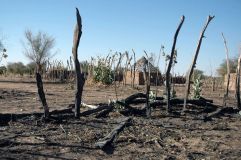Darfur survivors tell of Janjaweed slaughter
Nov 17, 2006 (SENEIT, Chad-Sudan border) — “They attacked without warning at dawn,” Ismail Abdallah Cherif said in a matter-of-fact way.
 “There were many of them. They came on horses and camels. Without asking any questions they just opened fire. Some people were in their beds, others were making tea. The Janjaweed made no distinction. Children, women, grandmothers — everyone was targeted. Only those who hid were saved,” he said.
“There were many of them. They came on horses and camels. Without asking any questions they just opened fire. Some people were in their beds, others were making tea. The Janjaweed made no distinction. Children, women, grandmothers — everyone was targeted. Only those who hid were saved,” he said.
Like many hundreds of others, Cherif has fled over the border to Chad since the attack by the Janjaweed militia on his village of Khabesh in the Jebel Moon area of West Darfur.
A United Nations human rights report says 22 people were killed in Khabesh, one of many villages attacked simultaneously on Oct. 29 by the Janjaweed, a largely Arab militia allied to Sudan’s government troops in Darfur’s war.
The government says the Janjaweed are bandits and denies any links to them.
“They raped our daughters and stole our cattle. I lost … my brother, two children and a nephew and niece,” said Alima, 30, who did not wish her family name to be published.
Crying, she clutched her headscarf around her face against the driving, dusty winds whipping across the open border landscape and told her story.
“They were killed in machine gun fire. They shot us in our houses, in our fields. If you ran away they chased you and killed you there,” she said.
Villagers describe a devastating series of assaults, with eight villages and a camp for displaced people being attacked killing more than 50 people in all, mostly children.
CHILDREN, OLD MEN SHOT DEAD
“Many women had their babies taken from them — the Janjaweed would lift the children’s clothing up to see if it was a boy or a girl. The boys would be killed, but the girls were left alone,” said Mahamat Adam Bicharahe.
He was in a camp for displaced people at Hijilija when the attackers struck, and escaped by climbing up a tree.
When the killing was over, Bicharahe went to help collect and identify the dead.
“There were children as young as three, and men as old as 70. We found a lot of bodies in fields. They had obviously run there to escape the attacks but had been chased by the Janjaweed,” he said.
Kiro, who is 7 but looks younger, managed to survive by hiding behind a tree during an attack.
“Three of them were shot dead along with their mother. My youngest daughter was killed — but somehow my other daughter managed to escape alive,” said her father, Muhammad Abakar Akim, as he held Kiro by the hand.
Abakar Barbika Abakar, 25, lost his mother in the attack. He says Sudanese soldiers joined in the attack.
“They wore khaki camouflage uniforms. The Janjaweed arrived first, but afterwards the military came in and supported them … The battle lasted from the morning until the evening,” he said.
“Basically our village doesn’t exist anymore,” he added. “It’s completely empty of people. And anyway, they burned it down so there’s nothing left.”
(Reuters)
